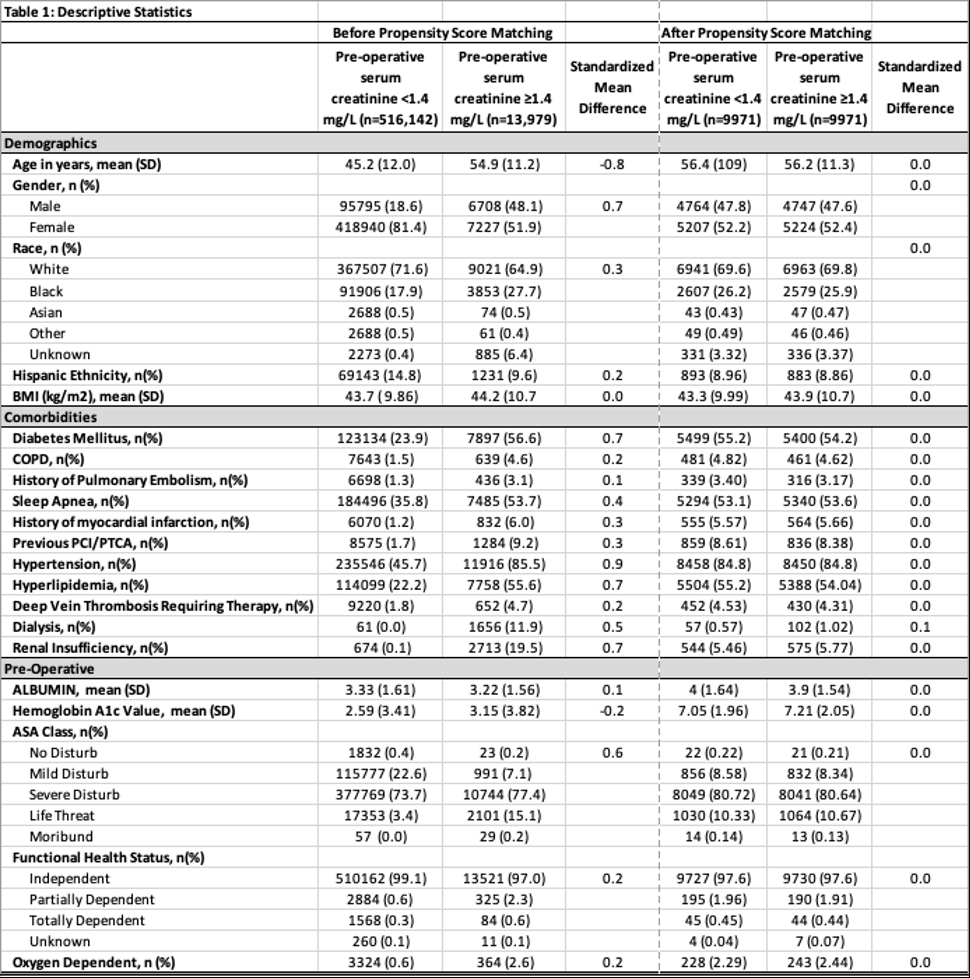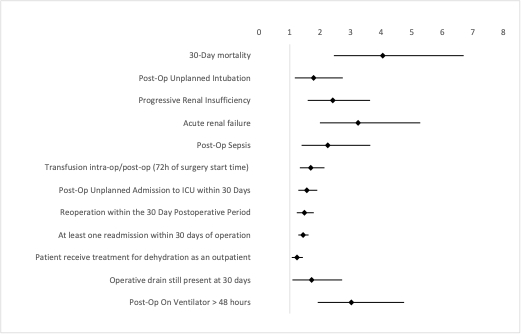Back to 2024 Abstracts
PRE-OPERATIVE SERUM CREATININE PREDICTS MORBIDITY AND MORTALITY IN METABOLIC AND BARIATRIC SURGERY - AN MBSAQIP PROPENSITY SCORE MATCHED ANALYSIS
Steven M. Elzein
*1, Daniel Tomey
1, Sara Butt
1, Maria Corzo
1, Halil Bulut
5, Sachin Shetty
3, Suman Shetty
8, Victor G. Peña
1, Roberto Secchi del Rio
9, Nnenna A. Osagwu
7, Victor Bolivar
6, Adel Abou-Mrad
4, Rodolfo J. Oviedo
21Surgery, Houston Methodist Hospital, Houston, TX; 2Nacogdoches Center for Metabolic and Weight Loss Surgery, Nacogdoches, TX; 3Baylor College of Medicine, Houston, TX; 4Centre Hospitalier Regional d'Orleans, Orleans, Centre-Val de Loire, France; 5Royal Brompton and Harefield Hospitals, London, United Kingdom; 6Universidad de Oriente, Cumana, Sucre, Venezuela, Bolivarian Republic of; 7All Saints University School of Medicine, Roseau, Saint George, Dominica; 8The University of Texas at Austin, Austin, TX; 9Universidad Anahuac Queretaro, Santiago de Queretaro, Querétaro, Mexico
BACKGROUND: Although a strong link has previously been established between obesity and elevated serum creatinine (Cr) levels, the correlation of pre-operative serum Cr levels with morbidity and mortality following metabolic and bariatric surgery (MBS) has not been thoroughly examined. The objective of this study is to explore the potential of preoperative serum Cr measurements to predict postoperative complications and mortality in patients undergoing MBS.
METHODS: All adult patients who underwent primary (non-revisional) MBS with complete records in the Metabolic and Bariatric Surgery Accreditation and Quality Improvement Program (MBSAQIP) database between 01/01/2015 and 01/01/2019 were included in the study cohort (528,815 patients). Patients were divided into two groups according to pre-operative serum Cr levels (< 1.4 mg/dL vs ≥ 1.4 mg/dL) and propensity score matching (PSM) was completed for each group. Conditional, multinomial, or ordinal logistic regression was performed following matching to calculate odds ratios (OR) along with 95% confidence intervals (CI).
RESULTS: A total of 13,979 patients underwent MBS with a pre-operative serum Cr level ≥ 1.4 mg/L during the study period. Baseline characteristics of each cohort are included in Table 1. Patients undergoing MBS with pre-operative serum Cr levels ≥ 1.4 mg/dL were more than four times more likely to experience mortality within 30 days post-operatively (OR 4.05, 95% CI: 2.45-6.70, p<0.001) compared to those with pre-operative serum Cr levels < 1.4 mg/dL. Furthermore, patients with elevated pre-operative Cr were more likely to require reoperation (OR 1.48, 95% CI: 1.23-1.79, p<0.001), readmission (OR 1.44, 95% CI: 1.28-1.62, p<0.001), or unplanned ICU admission (OR 1.56, 95% CI: 1.28-1.90, p<0.001) within the 30-day post-operative period. They were also more likely to require unplanned re-intubations (OR 1.78, 95% CI: 1.17-2.74, p<0.01) and > 48 hours of ventilatory support (OR 3.02, 95% CI: 1.92-4.75, p<0.001). Intra- or post-operative cardiac arrest requiring CPR (OR 5, 95% CI: 1.91-13.1, p<0.001), transfusion requirement (OR 1.69, 95% CI: 1.33-2.14, p <0.001), and post-operative stroke (OR 5.5, 95% CI: 1.22-24.8, p=0.01) were also more likely in those with elevated pre-operative Cr levels. Lastly, these patients were more likely to receive treatment for dehydration as an outpatient (OR 1.24, 95% CI: 1.07-1.43, p=0.004) and to have an indwelling operative drain remaining at 30 days post-operatively (OR 1.72, 95% CI: 1.09-2.72, p=0.02).
CONCLUSION: In conclusion, this analysis demonstrates that patients undergoing MBS with pre-operative serum Cr levels ≥ 1.4 are more likely to experience post-operative morbidity and mortality compared to those with pre-operative serum Cr levels < 1.4 mg/dL.


Back to 2024 Abstracts

